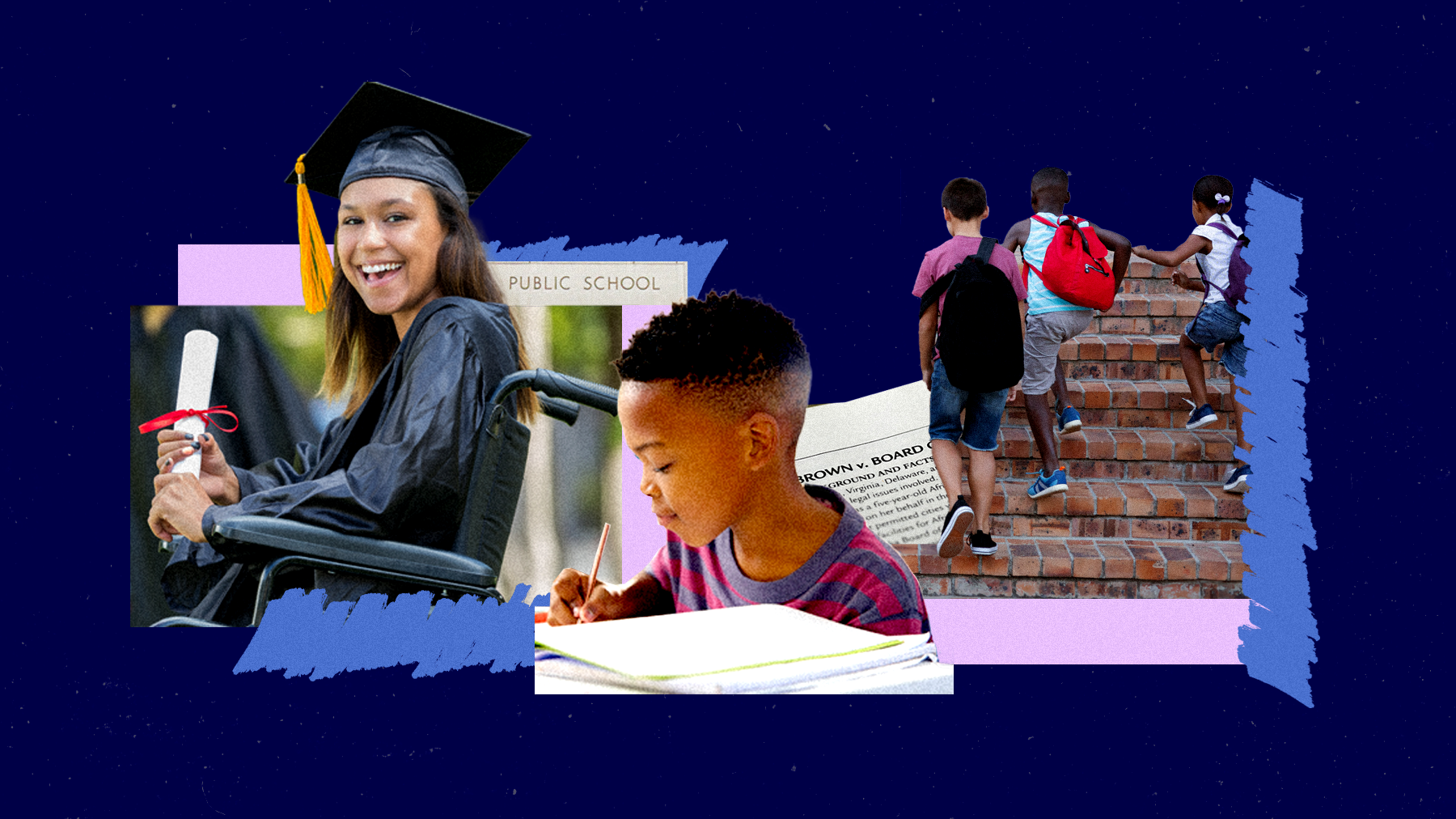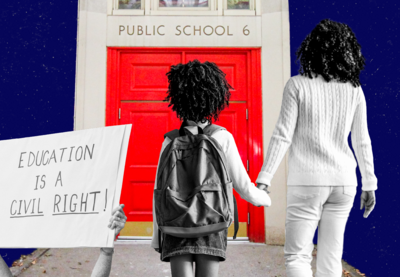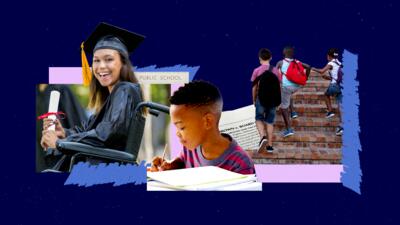School voucher programs are not only deeply rooted in overt racism — seeking to segregate white students from non-white students (immediately following the Brown decision and in contemporary times) — but also carry with them destructive effects across all levels of public schools and communities.
School vouchers are an increasingly popular topic as politicians and special interest groups push for ways to defund public schools and shift public money into private hands.
The recent flurry of legislation at the state and national levels might seem novel, but school vouchers are not a new concept. Initially championed by Ronald Reagan’s economic adviser Milton Friedman as a mechanism for white families to avoid integration efforts after the Supreme Court decision in Brown v. Board of Education of Topeka, Kansas, vouchers have been a mainstay in the arsenal of those seeking to defund public schools, exacerbate racial and economic class segregation, and move public funds into private for-profit and religious institutions.
While the arguments for vouchers often use common-sense language and catchphrases like parental or school “choice,” they fail to accurately convey the sinister history of vouchers and the detrimental impact they have on public schools, students and communities. Additionally, even though vouchers are heralded as providing families with school “choice,” when it comes to private schools, the schools ultimately decide to whom they choose to allow a private membership.
Privatization: Dismantling the Common Good
Assume that a state lawmaker proposed a bill that argued a family “dissatisfied” with the local public park’s tennis courts should receive a refund of their taxes allocated for parks and recreation to subsidize membership at a private country club with “better” tennis courts. Or a family dissatisfied with the basketball courts or community pool should get tax money back to offset the cost of a private gym. The general public might not recognize these bills as a threat to local parks because the loss of a single taxpayer’s contribution to the collective pot might seem insignificant.
People might, however, begin to understand this proposal as a legitimate threat to the public park if enough families fled the public space with their tax money and flocked to private country clubs where membership is required. With enough families withdrawing tax dollars to pay for private memberships, people might understand this as a threat to the ability of the local parks to continue providing equal access to the public facilities — and with less public funding, the quality of those facilities would dwindle. When understood this way, it becomes clearer that a law allowing families to withdraw their tax money for parks and recreation could jeopardize other families’ access to local parks as these spaces are diminished and access to facilities becomes shielded behind the private membership-only paywall.
Apply this hypothetical to any public good — such as libraries, roads, policing, firefighting — and the general public would likely reject legislation that sought to privatize these services and restrict them to only those who can afford membership. Privatizing public goods begins to break down society’s access to those services and threatens our collective well-being.
To make matters worse, imagine that the legislation allowed a single family to withdraw not only their tax dollars for the public park but also the tax dollars collected on behalf of other families. That is, the family seeking to offset some of the cost of their private country club membership would be able to recoup their parks and recreation tax funds as well as the tax money from five or six other families to further offset the cost associated with membership at a private country club. In this scenario, the legislator proposing the bill would be hard-pressed to find public support for such an effort, as it would clearly seek to benefit the few at the direct expense of the many.
School Vouchers and the Dismantling of Public Schools
The aforementioned hypothetical scenario illustrates how school vouchers operate and how they threaten public schools.
School vouchers provide taxpayer public funds to individual families to offset some of the costs associated with membership at a private school. Vouchers in Georgia, for example, provide families with up to $6,500 to help offset costs for private school or homeschooling. Considering that the average private school tuition in Georgia in 2025 is estimated to be $12,750, any family using a voucher — which includes tax dollars from other families — must pay the difference between what the voucher covers and the full tuition. This alone should make it apparent that despite discourse claiming vouchers are about “helping poor kids” out of “failing” public schools, the cost of membership at a private school remains out of financial reach for most families.
Research has documented that private schools tend to raise the cost of their membership after vouchers are enacted and the majority of families who use vouchers are those who already had memberships at a private school. This means that often vouchers become mechanisms for tax money to be siphoned away from funding local public schools that serve all children to provide a subsidy for more affluent families — those already in private schools. To continue with the private country club analogy, the majority of recipients of a voucher to help offset the costs of a private membership at a country club were already members when the legislation passed or was expanded to include them.
Additionally, considering geographic realities, rural families who desire to send their children to private schools will be unable to do so, as the majority of private schools are in suburban and metropolitan areas. This means suburban affluent families who already enroll their children in a private school will be allowed to receive state funds that would otherwise have gone to rural areas — directly threatening rural public schools. In fact, prior to Georgia’s creation of a near-universal voucher scheme, the state operated a limited voucher program for students with disabilities. Using only this data, which represents a fraction of the new voucher program, rural areas experienced a massive drain of state funding, with the money going to urban districts.
Another often-overlooked reality surrounding vouchers is the religious nature of many private schools. The United States Constitution’s Establishment Clause of the First Amendment prohibits the government from supporting or limiting religion, which is understood to prohibit government funding of religious organizations. In order to get around this prohibition, many states establish an intermediary organization that collects the tax allocation from the state on behalf of a family and then disperses these public funds to private religious schools — in other words, operating like a shell corporation.
Religious private schools can deny membership on religious grounds. Further, because private schools are private entities, they can deny membership (either during application or by rescinding membership after enrollment) on nearly any grounds they wish. In the same way that Costco, for example, can rescind membership from an individual for behavior it deems inconsistent with its business model, a private school can rescind a student’s membership based on the student’s academic performance, behavior, sexual orientation, religion, etc.
Recently, the Supreme Court of South Carolina held that the voucher bill passed there violated its state’s constitution which prohibits public funds from being used “for the direct benefit of any religious or other private educational institution.” The ruling fundamentally upheld that vouchers are not a public choice since private schools are the ones that choose which students to whom they allow membership. In addition, the court recognized that vouchers represent a threat to the state’s obligation to fund public schools.
What Are the Impacts of School Vouchers?
School voucher programs are not only deeply rooted in overt racism — seeking to segregate white students from non-white students (immediately following the Brown decision and in contemporary times) — but also carry with them destructive effects across all levels of public schools and communities.
Student-Level Impacts
- Disruption or destruction of integration efforts: The U.S. has a long way to go toward desegregation (across much of society and our schools). Vouchers and other school “choice” schemes like charters and homeschooling exacerbate socioeconomic and racial segregation. This is counterproductive to preparing students for a multicultural society.
- Data indicate lower academic performance (which can lead to school push-outs) — resulting in shifting the goalposts from achievement to other outcomes in recent years: Researchers have documented negative academic impacts for students who use a voucher to attend private schools. And because private schools can rescind a student’s membership at any time, low academic performance can be grounds for expulsion. While academic achievements were once an “artifact” to argue that school choice “worked,” those pushing vouchers have since conceded the negative academic impacts and have moved the goalposts to other metrics in an attempt to justify their policies.
- Fewer protections for students from communities that have historically faced discrimination (e.g., students with disabilities, LGBTQ+ youth, English language learners and more): Federal requirements do not obligate private schools to provide services for students with special needs or a robust framework of protections for students who belong to marginalized groups. Therefore, federal funds going into the hands of private organizations — who, by design, are allowed to discriminate against students, their families, and the teachers they employ — raises significant concerns. Without public oversight and accountability to civil rights and disability laws, the funds used for vouchers open the door for blatant taxpayer-funded bigotry, racism, religious oppression and discrimination.
Family-Level Impacts
- Transportation costs for private schools: Most private schools do not provide transportation as part of the cost of membership. So, in addition to a family having to pay for their student to have a private membership, they must provide regular and reliable transportation on their own.
- Tuition gap: The allocation for a voucher is usually not sufficient to cover the full cost of private school tuition. The difference between what the voucher covers and the full cost must be paid by the individual family — thus making vouchers an option for more affluent families who, as a result of the voucher, are receiving a public subsidy for their private membership.
- Volunteer requirements: Many charter school networks and private schools require parents to provide volunteer hours or additional monetary donations as part of their membership. This makes membership difficult for families who work (or who work more than one job).
- Uniforms: Many private schools require uniforms, which represent an additional cost associated with membership.
- Adherence to religious/political ideology: As noted, private schools are exempt from many of the federal and state laws surrounding discrimination. Namely, private schools that are religious institutions (which is the vast majority) can require statements of faith and adherence to a specific denomination or theological ideology in order to be granted membership.
Teacher-Level Impacts
- Loss of funding leads to job losses and larger class size in public schools: As vouchers drain money away from public schools to help affluent (usually white) families subsidize membership in a private school, public schools are faced with less funding. Because employees are often the highest budget item for schools, budget cuts often lead to teacher layoffs, leading to an increase in class size, which is detrimental to student achievement.
- No standard requirement for teacher credentials in private schools: Public schools across the nation have standard credentialing requirements for teachers. For traditionally certified teachers in public schools, a college degree that includes training in pedagogy and the content area(s) is standard, along with background checks, ongoing professional development and more. This process is overseen by colleges of education in partnership with the state’s teacher licensing body — which also oversees ethics complaints. While private schools can require their teachers to be college graduates, there is no mandate for them to do so since they are private and not beholden to the same accountability laws that public schools are held to.
School-Level Impacts
- Direct loss of funding: As noted, the loss of funding for a public school (via budget cuts, vouchers or any other mechanism) impacts overall ability to provide effective learning environments. In addition to larger class sizes as a result of teacher layoffs, schools that experience funding losses also must shoulder the burden of higher costs per student (e.g., the cost of having the lights on in the school remains the same no matter how many students attend, but that cost is more manageable with more funding).
- Concentration of students with disabilities and English language learners (with less funding, which strains services): Because private schools are not fully obligated to provide services for students with disabilities or English language learners, or because a private school may simply refuse to extend a membership to those students for myriad reasons, this leaves public school as the only option for these students. This can result in a concentration of students with special needs, for example, in a school that is also facing shrinking funding due to vouchers but which must attempt to serve a higher concentration of students who require additional services.
Community-Level Impacts
- Loss of common good to the community: Public schools are often a central space in local communities. The reduction in funding and closing or consolidation of public schools (due to loss of enrollment) in favor of charters is a direct threat to communities. With public schools being the cornerstone of democracy, their erosion represents an existential threat to our communities and nation.
- Economic loss to communities: Public schools are often major employers in local communities. Budget cuts to public schools, along with school closures, mean job losses for community members. In addition, schools encourage families to move to neighborhoods; loss of local public schools or lowered funding can have deep economic impacts for communities.
- Loss of oversight of tax dollars and curriculum: Anyone in a local community is able to provide thoughts and input about the local public school, the curriculum, programs and more. This right extends to parents as well as the broader community who may not have children for the specific reason that what happens in the local public school impacts the entire community. While private schools should be responsive to members’ concerns, there is no public oversight of private schools. If private schools were privately funded, this would make sense. However, in the case of vouchers, public funds are used for private schools, but taxpayers and community members do not have oversight into how their tax dollars are being used at the school. Because most families do not pay $6,500 in taxes to their local school each year, this means that the cost of the voucher is shouldered by multiple families who no longer have the ability to critique how their money is being used.
- No accountability via assessment data (caveats notwithstanding): Some private schools administer tests, but the vast majority do not. While it is true that public schools have, in recent decades, engaged in far too much testing, private schools are not obligated to administer state standardized tests. Tests are not the only mechanism for school accountability, but the lack of a testing requirement despite receiving taxpayer funding should raise concerns.
Vouchers, and the messaging from those who support them, are designed to undermine public education. By funneling public taxpayer money away from public schools, they whittle away the ability to provide a high-quality education that is free at the point of service to all children in a community. This allows continued claims of a failing public education system. Yet, what is truly at stake is the future of a system that operates for the common good. Community public schools not only provide families with a quality education but also act as a unifying presence in the community by providing meals, opportunities for socialization, and even shelters in times of emergency. Straining these services not only hurts the education system but also targets communities that often rely on public education as a path toward a thriving life.
Before supporting or applying for vouchers, stop and consider the serious long-term harm to students, families, educators and your community. The dismantling of public education has far-reaching negative impacts for our nation and future.
Read More
Public schools are an ideal and vital mechanism to achieve a thriving democracy. The current efforts to dismantle public education (and our democracy) include removing vital resources from public schools.

Read the previous articles in this series on public schools as a common good, examining possibilities and threats.
Why Public Schools Matter

Understanding How Schools Are Labeled
Reflection and Action:
- Consider what school “choice” means in the context of private school membership in which the school makes the choice of which students can and cannot obtain a membership. What does that mean for accountability?
- With the use of public funds for private schools (often religious or exclusionary institutions), consider who benefits and who loses. Whose children are most affected?
- Think about what it means for students, teachers, parents and caregivers, and the community for their local public school to be defunded in favor of vouchers for private schools. What would it mean for your community?
- If vouchers only cover a small part of the cost of membership in a private school, what does that tell us about whom the vouchers are designed for (now or in the future with eligibility expansions)?

Take action: Join us in advocating for public education that fosters excellence and equity. Learn more with Learning for Justice’s “Advocating for Public Schools” resource.
Resources
Join us in advocating for public education that fosters excellence and equity. Learn more and take action with these resources:
- Advocating for Public Education (Learning for Justice)
- Understanding the Role and Responsibilities of the Department of Education (Learning for Justice)
- Issue Explainer: Vouchers (National Education Association)
- The Fiscal Consequences of Private School Vouchers (Public Funds Public Schools)
- Inequity in School Funding: Southern States Must Prioritize Fair Public School Spending (Education Law Center)
- Miles To Go: The State of Education for Black Students in America (Southern Education Foundation)
- Interactive Tools (Public Funds Public Schools)
- Voucher Bill Tracker (Public Funds Public Schools)
- Florida Private Education Vouchers Cost $4 Billion This School Year (Education Law Center)
- Action Kit: Stop Closing Public Schools (Advancement Project)
- The Dangers of Private School Vouchers for Idaho Students, Schools, and Communities (Public Funds Public Schools and Idaho Center for Fiscal Policy)
- How Vouchers Harm Public Schools (Economic Policy Institute)

Demanding Excellence and Equity
Education Justice Series
Public education is an essential common-good service and a cornerstone of democracy. This series can help us recognize damaging policies and practices and formulate strategies to ensure equitable public education.

